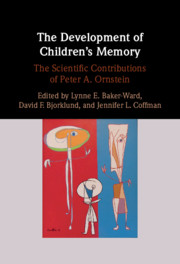21 results
Part III - Children’s Event Memory
-
- Book:
- The Development of Children's Memory
- Published online:
- 28 May 2021
- Print publication:
- 10 June 2021, pp 91-164
-
- Chapter
- Export citation
Part VI - Perspective
-
- Book:
- The Development of Children's Memory
- Published online:
- 28 May 2021
- Print publication:
- 10 June 2021, pp 297-318
-
- Chapter
- Export citation
Chapter 13 - The Socialization of Gratitude
- from Part IV - Family Socialization of Memory
-
-
- Book:
- The Development of Children's Memory
- Published online:
- 28 May 2021
- Print publication:
- 10 June 2021, pp 203-222
-
- Chapter
- Export citation
Figures
-
- Book:
- The Development of Children's Memory
- Published online:
- 28 May 2021
- Print publication:
- 10 June 2021, pp x-x
-
- Chapter
- Export citation
References
-
- Book:
- The Development of Children's Memory
- Published online:
- 28 May 2021
- Print publication:
- 10 June 2021, pp 319-369
-
- Chapter
- Export citation
Part II - Children’s Memory Strategies
-
- Book:
- The Development of Children's Memory
- Published online:
- 28 May 2021
- Print publication:
- 10 June 2021, pp 43-90
-
- Chapter
- Export citation
Part V - Classroom Socialization of Memory
-
- Book:
- The Development of Children's Memory
- Published online:
- 28 May 2021
- Print publication:
- 10 June 2021, pp 235-296
-
- Chapter
- Export citation
Tables
-
- Book:
- The Development of Children's Memory
- Published online:
- 28 May 2021
- Print publication:
- 10 June 2021, pp xi-xi
-
- Chapter
- Export citation
Contributors
-
- Book:
- The Development of Children's Memory
- Published online:
- 28 May 2021
- Print publication:
- 10 June 2021, pp xii-xiv
-
- Chapter
- Export citation
Part I - Backdrop
-
- Book:
- The Development of Children's Memory
- Published online:
- 28 May 2021
- Print publication:
- 10 June 2021, pp 1-42
-
- Chapter
- Export citation
Dedication
-
- Book:
- The Development of Children's Memory
- Published online:
- 28 May 2021
- Print publication:
- 10 June 2021, pp v-vi
-
- Chapter
- Export citation
Chapter 15 - Overview
- from Part V - Classroom Socialization of Memory
-
-
- Book:
- The Development of Children's Memory
- Published online:
- 28 May 2021
- Print publication:
- 10 June 2021, pp 237-257
-
- Chapter
- Export citation
Copyright page
-
- Book:
- The Development of Children's Memory
- Published online:
- 28 May 2021
- Print publication:
- 10 June 2021, pp iv-iv
-
- Chapter
- Export citation
Chapter 1 - The Emergence of the Developmental Science of Memory
- from Part I - Backdrop
-
-
- Book:
- The Development of Children's Memory
- Published online:
- 28 May 2021
- Print publication:
- 10 June 2021, pp 3-10
-
- Chapter
- Export citation
Chapter 16 - Children’s Accuracy and Strategy Use in the Context of Addition
- from Part V - Classroom Socialization of Memory
-
-
- Book:
- The Development of Children's Memory
- Published online:
- 28 May 2021
- Print publication:
- 10 June 2021, pp 258-272
-
- Chapter
- Export citation
Part IV - Family Socialization of Memory
-
- Book:
- The Development of Children's Memory
- Published online:
- 28 May 2021
- Print publication:
- 10 June 2021, pp 165-234
-
- Chapter
- Export citation
Index
-
- Book:
- The Development of Children's Memory
- Published online:
- 28 May 2021
- Print publication:
- 10 June 2021, pp 370-382
-
- Chapter
- Export citation
Contents
-
- Book:
- The Development of Children's Memory
- Published online:
- 28 May 2021
- Print publication:
- 10 June 2021, pp vii-ix
-
- Chapter
- Export citation

The Development of Children's Memory
- The Scientific Contributions of Peter A. Ornstein
-
- Published online:
- 28 May 2021
- Print publication:
- 10 June 2021
10 - Parent Socialization of Children's Gratitude
- from Part III - Developing Gratitude
-
-
- Book:
- Developing Gratitude in Children and Adolescents
- Published online:
- 07 December 2017
- Print publication:
- 26 October 2017, pp 199-219
-
- Chapter
- Export citation

